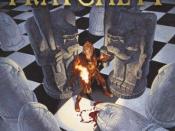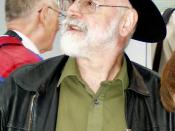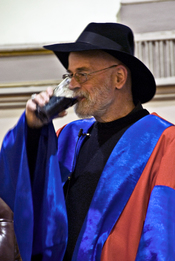When cultures collide, and innocent bystanders are caught in the middle, how far does the right to hold separate beliefs extend? Does one culture have a right to infringe on those beliefs, if its people are in danger? In "Thud!", through his use of Commander Vimes as a catalyst, Terry Pratchett illustrates his belief that the freedoms of individuals supercede those of cultural identity.
Reminiscent of the race riots in our country's history, the trolls and dwarfs, warring for centuries, are endangering the citizens of Ankh-Morpork with riots, when a hatemongering dwarf is killed, and a troll club is found at the scene. This illustrates the line between free speech and cultural tension, as opposed to hate and crime. The commentary is largely implied, as it is set within the characters' dialogue and descriptions of the events in the novel. "And, until now, that [grags, the dwarf leaders] had been fine by Vimes.
Up until now, though, the grags in the city had stopped short of advocating murder" (Pratchett 58).
With Vimes, (commander of the City Watch), as a mediator between the two races, Pratchett portrays the world through a police officer's perspective, whose only aim is to protect his city. Pratchett allows the reader to form his or her own opinion, but directs his or her thoughts by either showing Vimes as an obviously mistaken but well meaning street cop, or as a logical voice of reason:
"He liked dwarfs. They made reliable officers, and dwarfs tended to be naturally law-abiding..." (58). This perception serves to set up the reader to see the ludicrous nature of the two sides' argument, and in doing so, the ridiculous nature of racism itself, inherited on both side simply because it had always been that way: "All this scrapping over something...


